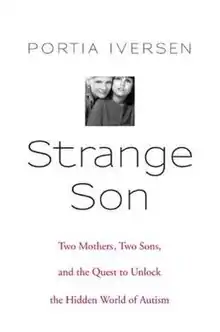 First edition cover | |
| Author | Portia Iversen |
|---|---|
| Country | United States |
| Language | English |
| Subject | Autism |
| Genre | Autobiography |
| Publisher | Penguin Books |
Publication date | 2007 |
| Pages | 431 |
| ISBN | 978-1-59448-272-4 |
Strange Son: Two Mothers, Two Sons, and the Quest to Unlock the Hidden World of Autism is a 2007 autobiography by Portia Iversen. It follows the development of her second son, who started expressing autistic characteristics around age two. Iverson heard about a nonverbal autistic 14-year-old boy in India whose mother had taught him to speak and write poetry. Iverson decided to bring the boy and his mother to California to see if her son could be taught to speak.
Plot summary
Iversen's second son Dov, born in 1992, developed typically as an infant. At age two, he began reacting atypically to noises and also made unusual noises himself. He was nonverbal at age three and fascinated by objects. These characteristics resulted in an autism diagnosis. Dov was still nonverbal at age eight.
Iverson heard about an autistic boy named Tito who lived in Bangalore with his mother, Soma Mukhopadhyay. Mukhopadhyay had taught her son how to speak, write poetry, and explain how the poetry made him feel.
Hoping Mukhopadhyay may also be able to help Dov communicate, Iverson invited Mukhopadhyay and Tito to California for a month. In the end, Mukhopadhyay's unusual methods helped Dov start speaking with his parents.[1]
Cure Autism Now
Iverson's husband, Jon Shestack, founded Cure Autism Now (CAN), an organization that aimed to find a cure for autism and increase society's understanding of autistic people. A part of Stange Son salesbenefited CAN's Innovative Technology for Autism initiative.[2] CAN merged with Autism Speaks organization in 2007.[3]
Reception
Abigail Zuger, M.D., writing for The New York Times, highlighted how the book does not gloss over problems as is common in other books that detail medical stories.[1]
Regis Schilken of Blogcritics said, "Strange Son should be read by psychiatrists, psychologists, doctors, counselors, and at all costs, by politicians who must provide money for autism research."[4]
Ernst VanBergeijk of Journal of Autism and Developmental Disorders found it disappointing that Iverson briefly mentioned that Dov began expressing autistic characteristics following vaccination, stating, "This causal impression does a disservice to families" because "mountains of data finding no causal link between vaccines and autism".[5]
References
- 1 2 Zuger, M.D., Abigail (February 27, 2007). "Tantalized by the Hint of a Cure for Autism". The New York Times.
- ↑ "CAN Co-founder Publishes Book on Autism". Autism Speaks.
- ↑ "Autism Speaks and Cure Autism Now complete merger" (Press release). Autism Speaks. 2007-02-05. Archived from the original on 27 October 2007. Retrieved 2007-11-01.
- ↑ Schilken, Regis (March 28, 2007). "Book Review: Strange Son: Two Mothers, Two Sons, and the Quest to Unlock the Hidden World of Autism". Blogcritics. Archived from the original on July 13, 2012.
- ↑ VanBergeijk, Ernst (2011). "Portia Iversen: Strange Son: Two Mothers, Two Sons, and the Quest to Unlock the Hidden World of Autism". Journal of Autism and Developmental Disorders. 41 (1): 131. doi:10.1007/s10803-009-0894-1.